Lavern Kelley: Farmer, Artist
Kelley was a farmer first, but admitted that art was where his heart was.
Lavern Kelley: Farmer, Artist
Kelley was a farmer first, but admitted that art was where his heart was.
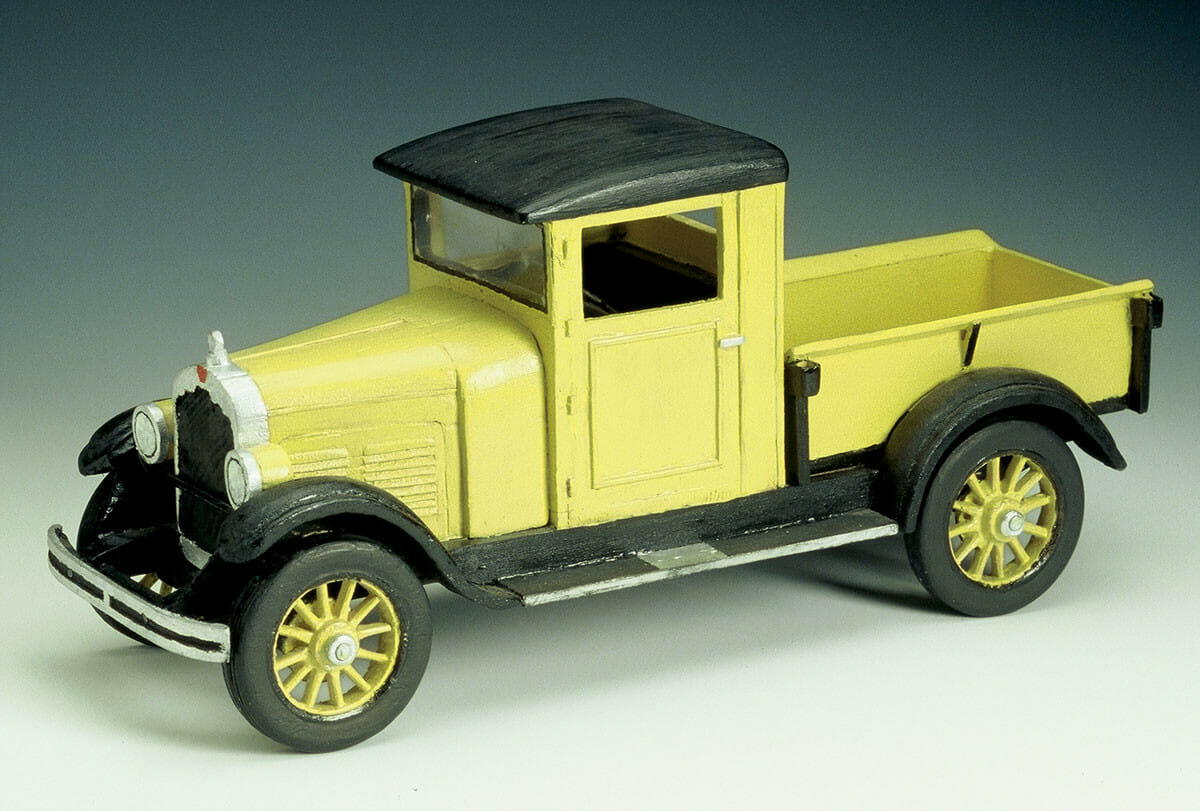
“The long evenings were always pleasant for me. After chores, we would have our supper, then I usually would draw pictures till bedtime,” Kelley would later recall about winters on the farm.
After his father’s death in 1946, Kelley, then 18, and his brother took over running the farm, and he continued to make art. But it would be nearly 40 years before he was recognized as the gifted artist he was.
Sydney Waller is an independent curator in Cooperstown, New York, who began showing Kelley’s work in the 1980s, represented him while he lived, and continues to oversee his estate.
“I was blown away by the care and precision that he was applying to these objects. It wasn’t what was going on in the contemporary field, particularly, at that time,” she says.
Waller met Kelley in the mid-80s when she was running Gallery 53, a nonprofit arts space, with Ann Gabler, in Cooperstown. A friend of theirs who had been collecting Kelley’s work told them about the artist.
“He was such an incredible human being, as well as such a committed artist. He had a really centered, profound sense of self. He had great dignity. His greatest joy was carving,” says Waller.
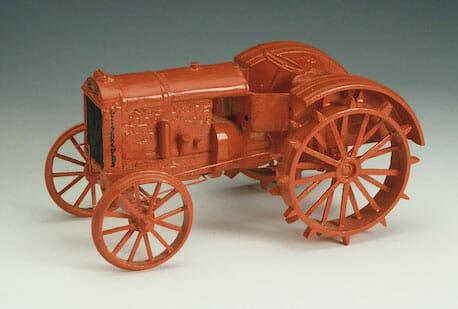
Nearly 20 years after his death from pneumonia in 1998, Kelley’s work is once again getting attention with a number of upcoming shows in various places in New York, including the North River Gallery in Chatham, which opens Saturday, July 18; two shows in Cooperstown, including a solo show at the Fenimore Art Museum, that start in September, and one in the summer of 2016 at The View in Old Forge.
Kelley’s art focused on precise renderings of 1/4-scale farm equipment, mostly from the 1930s to 1950s, made with a “tiny little pen knife,” and then precisely painted, says Waller. Some of these were made while his family was still farming with horse-drawn plows. Waller believes that there may have been a wish-fulfillment aspect to Kelley’s art making.
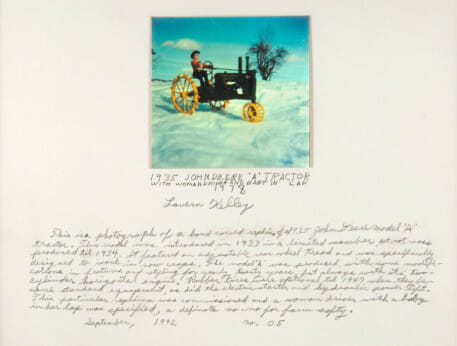
“What they say about folk artists is they do what they know from their own environment, and to a degree that was true, but it was also what was missing from his own environment,” she says.
Kelley later began carving small figurines depicting rural life at the request of patrons. One of these, of a one-room school house (like the one Kelley attended) featuring two students and a teacher, is on display at the Smithsonian Museum of American Art in Washington, D.C., one of several institutions that have Kelley’s work in their permanent collection.
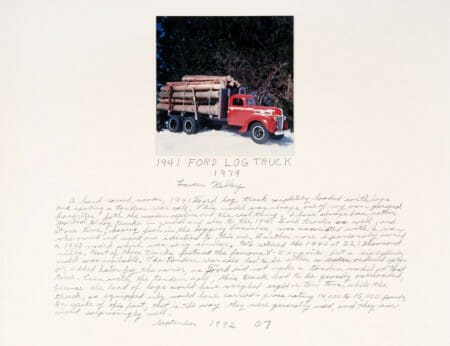
Kelley made trompe l’oeil photographs of his wooden sculptures by photographing them outdoors using actual buildings and other scenery as backdrops in order to make it appear as if the vehicles were real, underscoring the accuracy of his renderings.
He also made drawings up until the 1950s. Because the family didn’t have a lot of money, Kelley drew on butcher paper and used both sides. Waller says Kelley brought her several hundred of these drawings in the 1980s that he had been storing under his bed for 30 years. She says she “was totally enthralled. He was documenting the way farming was done in the 40s and 50s.”
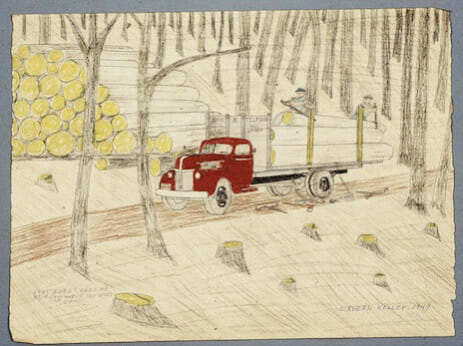
Waller believes Kelley’s work “harkens back to an earlier time in farming” bringing it to life, through his methodical documentation of this “important chunk of American history and culture.”
Kelley was a farmer first, but admitted that art was where his heart was.
“In spite of all the other things I have done, and enjoyed…the artistic angle is what I’ve always enjoyed best, but never gave a thought to pursuing it as work or business. Now since 1975 it has taken on that sort of importance, and since 1985 it has virtually become a business, and my main one at that. It has been the most pleasant and certainly the most profitable time of my life, and after a lifetime of hard physical work, it is quite relaxing as well,” he wrote.
Images courtesy of Sydney Waller.
Follow us
This work is licensed under a Creative Commons Attribution-NoDerivatives 4.0 International License.
Want to republish a Modern Farmer story?
We are happy for Modern Farmer stories to be shared, and encourage you to republish our articles for your audience. When doing so, we ask that you follow these guidelines:
Please credit us and our writers
For the author byline, please use “Author Name, Modern Farmer.” At the top of our stories, if on the web, please include this text and link: “This story was originally published by Modern Farmer.”
Please make sure to include a link back to either our home page or the article URL.
At the bottom of the story, please include the following text:
“Modern Farmer is a nonprofit initiative dedicated to raising awareness and catalyzing action at the intersection of food, agriculture, and society. Read more at <link>Modern Farmer</link>.”
Use our widget
We’d like to be able to track our stories, so we ask that if you republish our content, you do so using our widget (located on the left hand side of the article). The HTML code has a built-in tracker that tells us the data and domain where the story was published, as well as view counts.
Check the image requirements
It’s your responsibility to confirm you're licensed to republish images in our articles. Some images, such as those from commercial providers, don't allow their images to be republished without permission or payment. Copyright terms are generally listed in the image caption and attribution. You are welcome to omit our images or substitute with your own. Charts and interactive graphics follow the same rules.
Don’t change too much. Or, ask us first.
Articles must be republished in their entirety. It’s okay to change references to time (“today” to “yesterday”) or location (“Iowa City, IA” to “here”). But please keep everything else the same.
If you feel strongly that a more material edit needs to be made, get in touch with us at [email protected]. We’re happy to discuss it with the original author, but we must have prior approval for changes before publication.
Special cases
Extracts. You may run the first few lines or paragraphs of the article and then say: “Read the full article at Modern Farmer” with a link back to the original article.
Quotes. You may quote authors provided you include a link back to the article URL.
Translations. These require writer approval. To inquire about translation of a Modern Farmer article, contact us at [email protected]
Signed consent / copyright release forms. These are not required, provided you are following these guidelines.
Print. Articles can be republished in print under these same rules, with the exception that you do not need to include the links.
Tag us
When sharing the story on social media, please tag us using the following: - Twitter (@ModFarm) - Facebook (@ModernFarmerMedia) - Instagram (@modfarm)
Use our content respectfully
Modern Farmer is a nonprofit and as such we share our content for free and in good faith in order to reach new audiences. Respectfully,
No selling ads against our stories. It’s okay to put our stories on pages with ads.
Don’t republish our material wholesale, or automatically; you need to select stories to be republished individually.
You have no rights to sell, license, syndicate, or otherwise represent yourself as the authorized owner of our material to any third parties. This means that you cannot actively publish or submit our work for syndication to third party platforms or apps like Apple News or Google News. We understand that publishers cannot fully control when certain third parties automatically summarize or crawl content from publishers’ own sites.
Keep in touch
We want to hear from you if you love Modern Farmer content, have a collaboration idea, or anything else to share. As a nonprofit outlet, we work in service of our community and are always open to comments, feedback, and ideas. Contact us at [email protected].by Andrew Amelinckx, Modern Farmer
July 17, 2015
Modern Farmer Weekly
Solutions Hub
Innovations, ideas and inspiration. Actionable solutions for a resilient food system.
ExploreExplore other topics
Share With Us
We want to hear from Modern Farmer readers who have thoughtful commentary, actionable solutions, or helpful ideas to share.
SubmitNecessary cookies are absolutely essential for the website to function properly. This category only includes cookies that ensures basic functionalities and security features of the website. These cookies do not store any personal information.
Any cookies that may not be particularly necessary for the website to function and are used specifically to collect user personal data via analytics, ads, other embedded contents are termed as non-necessary cookies.